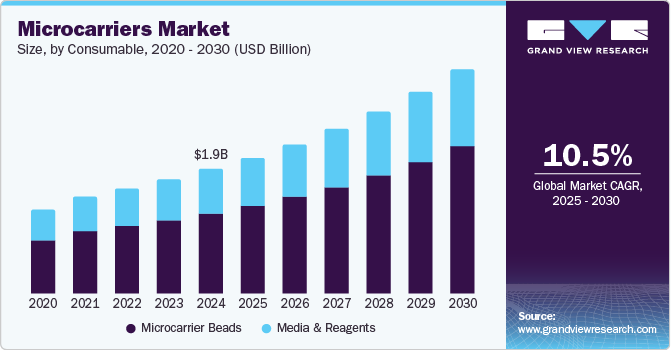Microcarriers Market Growth Accelerated by Expansion of Cell Banks

The global microcarriers market size was estimated at USD 1,945.7 million in 2024 and is projected to reach USD 3,500.8 million by 2030, growing at a CAGR of 10.5% from 2025 to 2030. This market growth is primarily attributed to the high demand for cell-based vaccines and therapeutics.
The increasing incidence of diseases such as diabetes, cancer, rheumatoid arthritis, and hemophilia, alongside significant investments in innovative therapy development and advancements in cell biology research, is fueling market expansion. For example, in May 2024, Sartorius partnered with Sanofi to co-develop a platform that enhances downstream bioprocessing, potentially advancing microcarrier-based technologies for efficient biopharmaceutical production.
The growing demand for cell-based vaccines and therapeutics remains a central driver of the market. These products offer targeted and effective treatment options for diseases like cancer and infectious disorders. Microcarriers are integral to this process, as they provide a supportive surface for large-scale cell culture expansion—crucial for vaccine and therapeutic manufacturing.
As the global population continues to age and expand, the prevalence of chronic and infectious diseases also rises. This demographic shift further accelerates the demand for novel cell-based treatments that utilize microcarriers for scalable and efficient cell culture.
Large-scale investments from pharmaceutical companies, biotech firms, and research institutions are driving innovation in cell-based therapies. These investments aim to develop scalable solutions using microcarriers for applications such as vaccines, gene therapies, and regenerative medicine. For instance, Eppendorf has focused on microcarrier-based systems to boost production efficiency and scalability.
Moreover, continuous technological advancements in cell biology research are enhancing the capabilities of microcarrier systems. Innovations in cell culture methods, bioreactor technologies, imaging, and biomaterials have significantly improved our understanding of cellular behavior, allowing for greater reproducibility and efficiency in manufacturing.
Order a free sample PDF of the Microcarriers Market Intelligence Study, published by Grand View Research.
Key Market Trends & Insights:
- Regionally, North America generated the highest revenue in 2024.
- Country-wise, China is projected to record the highest CAGR from 2025 to 2030.
- Segment-wise, microcarrier beads generated USD 1,374.2 million in revenue in 2024.
- Consumables, especially microcarrier beads, are expected to be the fastest-growing segment through 2030.
Market Size & Forecast:
- 2024 Market Size: USD 1,945.7 Million
- 2030 Projected Market Size: USD 3,500.8 Million
- CAGR (2025–2030): 10.5%
- North America: Largest regional market in 2024
Key Microcarrier Company Insights:
The microcarriers market is witnessing strong momentum due to continuous innovation and the increasing application of advanced technologies in cell biology. The growing need for effective disease treatments has created numerous opportunities in the cell therapy space. New market entrants and existing players are launching advanced solutions to meet evolving demands. For instance, in September 2023, Thermo Fisher Scientific introduced Gibco CTS Detachable Dynabeads—a new technology designed to streamline cell therapy manufacturing in clinical and commercial settings. The entry of such technologies intensifies market competition and accelerates innovation across the industry.
Key Players in the Microcarriers Market:
- Thermo Fisher Scientific, Inc.
- Merck KGaA
- Danaher Corporation
- Sartorius AG
- Corning Incorporated
- Eppendorf SE
- Bio-Rad Laboratories, Inc.
- HiMedia Laboratories Pvt. Ltd.
- denovoMATRIX GmbH
Explore Horizon Databook – The world's most expansive market intelligence platform developed by Grand View Research.
Conclusion:
The global microcarriers market is set for robust growth driven by rising healthcare needs, advancements in cell-based therapies, and strong R&D investments. With chronic and infectious diseases on the rise, and continuous technological progress, microcarriers are becoming indispensable in large-scale bioproduction. The competitive landscape is also intensifying as established players and new entrants alike strive to introduce efficient, scalable, and innovative solutions, positioning the microcarriers market as a key component of the future biotechnology ecosystem.
- Art
- Causes
- Crafts
- Dance
- Drinks
- Film
- Fitness
- Food
- Games
- Gardening
- Health
- Home
- Literature
- Music
- Networking
- Other
- Party
- Religion
- Shopping
- Sports
- Theater
- Wellness


